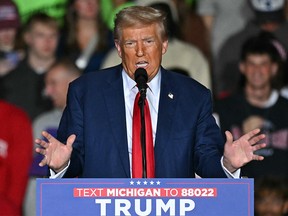| | | Conrad Black: Pro-Trump argument carries the house
Chris Christie, John Manley, Martha Lou Findlay and Conrad Black debate the opportunities to be afforded by another possible Trump presidency
Author of the article:
Conrad Black
Published Oct 05, 2024 • Last updated 18 hours ago • 5 minute read
463 Comments

Former U.S. president and Republican presidential candidate Donald Trump speaks during a campaign rally in Saginaw, Mich., on Oct. 3, 2024. Photo by IM WATSON / AFP via Getty Images
The C.D. Howe Institute has invited me to use this column to summarize the Regent Debate that the institute held in Toronto on Sept. 24. It was a well-attended and rollicking affair with a learned audience of several hundred or more people. The former governor of New Jersey, Chris Christie, and I defended the motion that the election of Donald Trump as president of the United States would be an opportunity for Canada. Our very worthy opponents were the former minister of finance John Manley, and the former Liberal politician and chair of the School of Public Policy at the University of Calgary, Martha Hall Findlay. It is well-known that after Christie described president Trump as “Donald Duck” during one of the Republican candidates’ debates (which Trump ignored and dismissed as “an audition for vice-president”), their relations are unlikely to resume anytime soon.
The former governor went to some lengths to explain that the lack of rapport between him and Trump should be taken as a reinforcement of his faith that Trump’s policies do justify optimism in Canada about a returned Trump administration. The three Canadian participants all stated or hinted that this country’s first requirement for economic progress is better policy-making in Ottawa, whoever may inhabit the White House for the next four years. All four participants spoke in sequence with the order reversed in mid-debate and for a fixed time. There were no interruptions and the judicious debate chairman, Bill Robson, head of the C.D. Howe Institute, closed microphones if the speaker went more than 10 or 15 seconds beyond the allotted time. The Canadian participants had all known each other for some years and the atmosphere was entirely convivial.
John Manley started with generalities about the tendency of American governments to presume somewhat upon Canada, but in his later comments he descended into the customary ad hominem myth-making and mudslinging about Trump personally. He inflicted upon us the malicious canard that Trump had dismissed Americans who died in foreign wars as “losers and suckers,” something the former president and close aides have vehemently denied; and he alleged that Trump had suggested that the Nazis and Antifa members who rioted at Charlottesville, Va., in 2017 were ”good people.” What Trump actually said, and his remarks are available on the internet, was that there were “very fine people” on both sides of the debate over whether or not to remove the equestrian statue of Gen. Robert E. Lee from downtown Richmond, the capitol of the Confederacy. Chris Christie conspicuously consulted his cellphone to remind himself, as he explained, of the wording of the resolution under discussion. Without, I trust, being unctuous, I expressed some disappointment in John’s line of argument because even if Trump had cloven feet and satanic horns jutting out of his head, it was irrelevant to what we were talking about, and that our side was not advocating Trump’s election as head of a cotillion or an etiquette society. Chris Christie said he agreed with three-quarters of the general disparagements of Trump but he was still confident in arguing for the resolution. |
|





